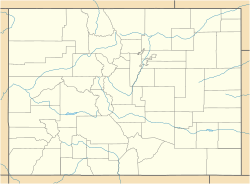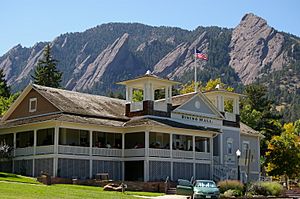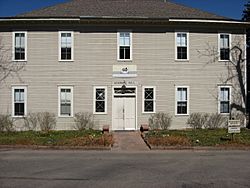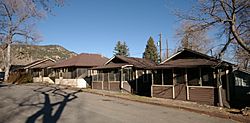Colorado Chautauqua facts for kids
|
Colorado Chautauqua
|
|
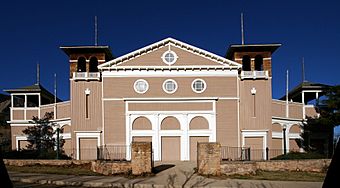
The Chautauqua Auditorium
|
|
| Location | 900 Baseline Road, Boulder, Colorado |
|---|---|
| Area | 40 acres (16 ha) |
| Built | 1898 |
| NRHP reference No. | 78000830 |
Quick facts for kids Significant dates |
|
| Added to NRHP | March 21, 1978 |
| Designated NHLD | February 10, 2006 |
The Colorado Chautauqua is a special place in Boulder, Colorado. It started way back in 1898 and is the only Chautauqua west of the Mississippi River that has been open non-stop since the 1920s. It's one of the few places like it still running in the United States today. In 2006, it was named a National Historic Landmark, which means it's a very important historical site. What makes it extra special is that it's the only Chautauqua that stays open all year round!
Contents
What is the Colorado Chautauqua Today?
The Colorado Chautauqua Association is a nonprofit organization that runs the Chautauqua. They offer many fun things to do all year, like interesting talks, live music shows, and even silent movies. While they have events all year, summer is their busiest time.
You can also find the Chautauqua Dining Hall here, and you can even stay overnight in one of their cozy cabins. The Association takes care of about 26 acres (110,000 m2) of land that they lease from the City of Boulder. All the old buildings are still used regularly, including:
- The 1898 Chautauqua Auditorium
- The 1898 Dining Hall
- The 1900 Academic Hall (now the Administration Building)
- The 1911 Missions House
- The 1918 Community House
- The 1919 Columbine Lodge
- 98 cottages, built between 1899 and 1954. Some are owned by people, and others are rented out by the Colorado Chautauqua Association.
Right next to the Association's land, there's a 14-acre (57,000 m2) city park called Chautauqua Park. This park is often called "Chautauqua Green." Both the park and the Association's land are open to everyone, and you don't need to pay to enter.
The whole 40-acre (160,000 m2) area, including both the Association's land and the park, became a National Historic Landmark in 2006. It's bordered by Baseline Road to the north and the City of Boulder Mountain Parks on other sides. People in Boulder usually just call the whole area "Chautauqua." Long ago, it was known as "Texado Park."
A Look Back: History of the Chautauqua
The Colorado Chautauqua has a rich history, starting in the late 1800s.
How it Began: The 1800s
1897: A New Idea for Teachers
The Texas-Colorado Chautauqua Association started in Austin, Texas in 1897. Their goal was to create a summer school and lecture series for Texas school teachers. They wanted a cooler place than Texas for the summer, so they looked to Colorado.
1898: Building the Dream
In February 1898, the Association and the City of Boulder agreed to build the Chautauqua near Boulder. The city voted to buy the land and build the first buildings.
The land chosen for the Chautauqua was called Texado Park. Construction began in May 1898 on the Chautauqua Auditorium and the Dining Hall. Both were ready for the first Chautauqua season, which opened on July 4, 1898.
However, there were a couple of challenges that first year. No cottages were built yet, so everyone stayed in tents. Also, the electric streetcar line from downtown Boulder wasn't ready. People had to walk or ride in horse-drawn vehicles on dusty or muddy roads.
The fee for the whole six-week season in 1898 was $75. This included classes, talks, entertainment, lodging, and even a round-trip train ticket to Boulder from parts of Texas.
The first season was packed with 94 speeches from famous people, governors, and university presidents. The Kansas City Symphony Orchestra played concerts all season and returned many times. There were also music classes and 51 different college-level classes in subjects like math, science, and languages.
The Colorado Chautauqua also showed movies from the very beginning. In 1898, they showed films about the war with Spain. Other activities included burro rides, hikes to the Flatirons, and train trips to nearby towns. These activities continued and grew until the 1920s.
1899: Getting Connected and More Cottages
The Electric Street Railway from downtown Boulder to Texado Park was finished in June 1899, just before the second season opened. Cars ran every 15 minutes, and the fare was only five cents.
The first cottages were built in the spring of 1899. By the second season, about 30 to 40 cottages were ready, but some people still stayed in tents until 1916.
William Jennings Bryan, a very famous speaker, visited the Chautauqua in July 1899. About 13,000 people came to hear him speak, filling the Auditorium and the nearby hillsides.
1900: New Buildings and Local Leadership
The Academic Hall was built in June 1900. Cottages continued to be built, including one by the Woman's Christian Temperance Union that offered rooms for 50 cents a night. Early Chautauqua talks often focused on social improvement, like promoting healthy living and encouraging people to be better citizens.
On December 20, 1900, the Texas-Colorado Chautauqua became the Colorado Chautauqua, with a local board of directors. The City of Boulder still owned the land, but the Colorado Chautauqua Association managed it. This change meant more local people attended and helped run the programs.
Growing Stronger: Early 1900s
The early 1900s were a time of growth for the Colorado Chautauqua. In 1904, famous bandleader John Philip Sousa and his band performed there.
Each summer, about 40 evening music programs were presented. There were also dramatic readings of plays by Shakespeare and Ibsen, and opera songs. In 1910, the Chicago Operatic Company performed "costumed recitals from grand opera."
Famous speakers like Billy Sunday gave talks to large crowds in 1909, 1924, 1925, and 1931. While the Chautauqua aimed to be open to all beliefs, some speakers focused on a strong Christian message.
Movies became more common starting in 1918. To save money on speakers, the Chautauqua Association decided to show more films. They promised to show only "the best productions" that were good for families and morally uplifting. Since they couldn't afford brand-new movies, they showed films that had been out for a while, like Oliver Twist and Rebecca of Sunnybrook Farm.
From 1918 on, about half of the evening shows were movies, and the other half were live talks and entertainment. Over time, movies became an even bigger part of the Chautauqua's offerings.
Changes Through Time: Mid-1900s
Over the years, big events like two world wars and the Great Depression changed things. Also, new entertainment like movies, radio, and television became popular. This meant fewer people came to the Chautauqua for its original programs.
The variety of shows decreased. While some talks and music performances continued, by the 1950s, most activities were showing movies in the Auditorium. The Colorado Chautauqua went through a quiet period, though some traditions, like the summer Sunday School program, continued.
As Boulder grew, the city reached the Chautauqua by the 1940s. Many cottages were updated for year-round use, and the Chautauqua became a residential area for people living in Boulder.
A New Beginning: Late 1900s
The 1970s were a tough time for the Colorado Chautauqua. Fewer people were visiting, and the buildings were getting old. The city of Boulder was even thinking about tearing down the Chautauqua to build a new convention center.
In 1974, a local editor named Laurence Paddock helped get the Chautauqua Auditorium listed on the National Register of Historic Places. This happened in 1978, and it changed everything! Instead of tearing it down, the city decided to restore it. This historic recognition was a turning point for the Chautauqua.
The Colorado Chautauqua slowly returned to its original purpose in the late 1900s. They started scheduling more live music and talks. Jazz and bluegrass concerts became very popular. Many famous musicians performed there, including Doc Watson, Lyle Lovett, and Randy Newman.
A big boost came in 1978 with the arrival of the Colorado Music Festival. This festival, featuring the Festival Orchestra, performs many concerts each summer and is still a major event at the Chautauqua today.
Audiences in the late 1900s also enjoyed talks from important figures like Al Gore and Jesse Jackson. Political speeches even returned in 1996 for the first time since 1932.
In 1995, the Chautauqua stopped showing second-run family films because people could watch movies at home with VCRs. However, the tradition of films continued with a silent film series that started in 1986. These silent films are still shown today, often with live piano music.
The Dining Hall was updated in 1979 and became a popular restaurant, which it still is. This helped the Chautauqua financially. While the Chautauqua once promoted healthy living and discouraged alcohol, the Dining Hall now serves wine and beer, showing how times have changed.
From almost closing down in the 1970s, the Colorado Chautauqua recovered to become a lasting part of the Boulder community and a piece of living history.
The Chautauqua Today: 21st Century
Today, during the summer, the Colorado Chautauqua hosts the Colorado Music Festival (CMF) in the Chautauqua Auditorium. This festival lasts six weeks and features the Colorado Music Festival Orchestra. It has received awards from groups like the League of American Orchestras and the National Endowment for the Arts because of its amazing musicians from all over the world. In summer 2020, the festival even held online concerts due to the global pandemic.
Images for kids
 | Ernest Everett Just |
 | Mary Jackson |
 | Emmett Chappelle |
 | Marie Maynard Daly |


